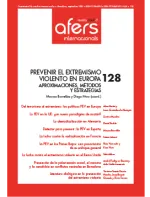Dialogic literature for preventing violent extremism (PVE): Ustaša hate speech

Verónica Yazmín García Morales, profesora de Derecho Administrativo y codirectora del Máster en Prevención de la Radicalización y Violencia Global, Universidad de Barcelona (UB) (veronicagarcia@ ub.edu). ORCID: 0000-0003-1105-7304
Josep Baqués Quesada, profesor de Ciencia Política, codirector del Máster en Prevención de la Radicalización y Violencia Global, UB. (jbaquesq@ub.edu). ORCID: 0000- 0002-8526-4149
Xavier Torrens, profesor de Ciencia Política, codirector del Máster en Prevención de la Radicalización y Violencia Global, UB (xaviertorrens@ub.edu). ORCID: 0000-0003-4664-7275
The underlying dynamics of the various kinds of extremism have, as a common feature, exclusion of the other through hate speech. One of the keys for preventing violent extremism (PVE) is working from the domain of public policy to combat the prejudices and stereotypes that shape discriminatory discourse. This study presents a project of education through literature in the framework of UNESCO’s PVE strategy. This proposal is constructed around a specific European case, Ustaša violence, which has allowed identification of three relevant areas when developing the PVE strategy: historical, literary, and dialogic. With a view to favouring human rights, the aim is to design public policies which, with a social impact in the domain of PVE, will consolidate recognition of the equal dignity of human beings.
Key words: preventing violent extremism (PVE), radicalisation, Ustaša, literature, education, anti-rumour strategy, dialogic policy, hate speech
How to cite this article: Cómo citar este artículo: García Morales, Verónica Yazmín; Baqués Quesada, Josep y Torrens, Xavier. «Literatura dialógica en la prevención del extremismo violento: el discurso de odio ustacha». Revista CIDOB d’Afers Internacionals, n.º 128 (septiembre de 2021), p. 201-223. DOI: doi.org/10.24241/ rcai.2021.128.2.201
>> The full text articles are available in Spanish language, although in this issue some of them are also available in English language.